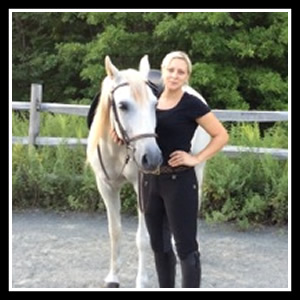My trainer insists that I only feed grass hay and almost no grain because my horse is too “high” and is too difficult to ride. My horse is quieter now but looks thin with no muscle. What should I do?
Get a new trainer. A person who feels they have the talent, expertise and know how to call themselves a trainer should not be starving horses into submission they should be training them. Even if a horse is difficult, making them weak isn’t training, just like turning them out and exhausting them isn’t either. No matter how difficult or “high” a horse is a trainer should know how to begin a process that will develop their minds while not depleting their bodies. Horses need to gain muscle to be able to perform the movements we are asking of them and to gain muscle they need to have a bit of surplus energy not a depletion. Neither should the horse be allowed to become too fat, this would also hamper their abilities.
We are also careful not to let the horse become too fit (meaning on a cardiovascular level) until their level of submission is appropriate. It becomes a vicious cycle if you have to exhaust your horse into submission because the more they become fit the harder you have to work them to reach the same level of submission and you will find yourself with a broken down horse that still isn’t trained. How can you possibly develop a top line if the horse isn’t being fed enough to develop any muscle and if they aren’t being asked to improve their carrying capabilities .
One response to “My trainer insists that I only feed grass hay and almost no grain because my horse is too “high” and is too difficult to ride. My horse is quieter now but looks thin with no muscle. What should I do?”
Leave a Reply
Hey Will and Karen! Thank you for continuing the great education. I appreciate your response on this question, as the question is obviously coming from the standpoint of a trainer not wanting a horse to be overly energetic (often seen with amateurs over-horsed). If the horse is too thin, then it is lacking protein for the amount of work and training being asked of it and is being starved into lower energy levels.
Similarly, many horses are being “over-fed” and killed with kindness – over-supplemented with a smart-this and a smart-that, until they have a complete imbalance of vitamins, minerals, and toxic levels of some compounds. And sometimes these “high” horses are so over-loaded on a nutritional plane, that they are then fed “calming” supplements to reduce their energy, when in fact regular, correct training, reduced nutrition (eliminating sweet feed and high fat) is far more beneficial.
Recent research has shown that some alfalfa may actually benefit horses prone to stomach ulcers by helping with the buffering effect.
There are some reasons not to feed alfalfa – risk of intestinal stones, horses with documented metabolic disease such as insulin resistance, horses prone to laminitis or founder (again- high sugar levels), and some horses have allergies to alfalfa.
Always consult your vet or equine nutritionist (PhD) regarding the best nutritional plane for your horse.
-Dr. Robson





Hey Will and Karen! Thank you for continuing the great education. I appreciate your response on this question, as the question is obviously coming from the standpoint of a trainer not wanting a horse to be overly energetic (often seen with amateurs over-horsed). If the horse is too thin, then it is lacking protein for the amount of work and training being asked of it and is being starved into lower energy levels.
Similarly, many horses are being “over-fed” and killed with kindness – over-supplemented with a smart-this and a smart-that, until they have a complete imbalance of vitamins, minerals, and toxic levels of some compounds. And sometimes these “high” horses are so over-loaded on a nutritional plane, that they are then fed “calming” supplements to reduce their energy, when in fact regular, correct training, reduced nutrition (eliminating sweet feed and high fat) is far more beneficial.
Recent research has shown that some alfalfa may actually benefit horses prone to stomach ulcers by helping with the buffering effect.
There are some reasons not to feed alfalfa – risk of intestinal stones, horses with documented metabolic disease such as insulin resistance, horses prone to laminitis or founder (again- high sugar levels), and some horses have allergies to alfalfa.
Always consult your vet or equine nutritionist (PhD) regarding the best nutritional plane for your horse.
-Dr. Robson